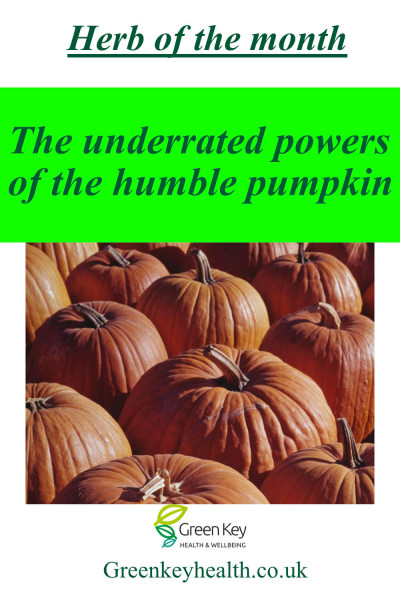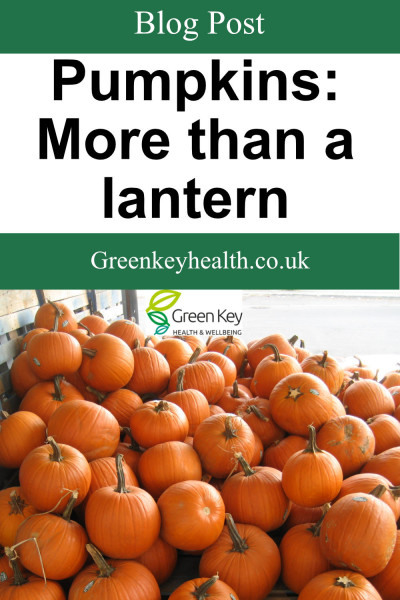
Pumpkin belongs to the Cucurbitaceae family, genus Cucurbita and is grown primarily as a vegetable or ornamental plant. It is extensively grown throughout tropical and subtropical countries, with the most common types worldwide being Cucurbita maxima, Cucurbita moschata, and Cucurbita pepo. The name pumpkin comes from a Greek word ‘pepon’, meaning a large melon. Pumpkins come in different shapes & colour, usually orange but can be yellow, white, green or red.
Pumpkins are one of the oldest domesticated plants, used as early as 7,500 to 5,000 BC and are extensively grown for commercial uses as food, aesthetics, and for recreational purposes.This versatile seasonal winter squash, which is technically a fruit as they contain seeds, is readily available this time of the year, but are often referred to as a vegetable when used in cooking. The seeds are typically planted sometime between the end of May and beginning of June, to be picked just in time for Halloween in October.

Halloween
Halloween at the end of this month, is the only time of year many of us, especially those with children go out and buy a huge pumpkin! Pumpkins are classic symbols of this season, whether it's carving one for the front porch as a colourful Halloween decoration or baking it into a pumpkin pie as a thanksgiving pie filler.
But, pumpkins are much more than this because they have a wide variety of nutrients when included as part of a healthy, daily balanced diet.
“People forget that pumpkins are actually food. But when you’re carving spooky lanterns for Halloween, you can easily recycle the seeds and use the flesh scooped out to turn into something tasty. During this time of Halloween, a huge number of pumpkins are ‘bought, carved and binned’, instead they could be turned into mouth-watering and quite healthy meals” says Kiri Elliott, Lecturer in Dietetics at Birmingham City University.
What's great about pumpkins is how useful they are. You can whizz your pumpkin into a soup, make pumpkin puree, serve mashed pumpkin with chicken recipes or other meat or vegetable dishes, use it in bread and in other baked goods, drink it in juices and smoothies, and eat dried pumpkin seeds as a tasty snack. If your Jack-o’-Lantern is still fresh when you throw it away, you’re making a foodie mistake as pumpkins are one of the most nutritious foods that are reasonably cheap to buy and can feed a large family.
Seeds as a Source of Oil and Nutrients
Pumpkin seeds also known as Pepitas, are small, flat, green, and possess a nutty flavour. They can be eaten as a snack as well as added to salads, muesli and sprinkled on cooked vegetables as a garnish. Pumpkin seed oil contains multiple nutrients which provide benefits for health and for the skin, including linolenic acid (omega-3 fatty acid), tocopherols (vitamin E), sterols, vitamin C, carotenoids, (antioxidants), zinc, magnesium and potassium.
Pumpkin seed oil can be used for food preparation and topically for skin care. It’s also available as a nutritional supplement and as an ingredient in skin care products. According to the National Library of Medicine (USA), pumpkin seed oil contains high amounts of antioxidant compounds, including polyphenols and carotenoids, which may help protect against inflammation and chronic diseases. Omega-6 fatty acid may be associated with improved heart health and blood sugar regulation.
Health Benefits of Pumpkin
Pumpkin offers many major health benefits as well as having a rich flavour. As with all fruits, vegetables and herbs the time of year they appear is relevant to the benefits and with pumpkin appearing in the Autumn season when flu and colds are prevalent the body requires more vitamin A and C to combat pathogens. Vitamin A is also very important for eye health.
Protects eye health
According to American Optometric Association in the studies of Pumpkin Nutrition benefits mentioned are that pumpkin is an excellent source of two carotenoids -lutein and zeaxanthin, antioxidants that have been shown to offer a protective factor against age-related macular degeneration. The Age-related Eye Disease Study (AREDS) states that, Beta-carotene, as well as vitamins C and E, help protect eyes and reduce the risk of age-related eye diseases. Age-related macular degeneration is the leading cause of blindness among older adults.
Promotes Hair Growth
Pumpkin is a rich source of minerals including potassium and zinc. Potassium helps in keeping hair healthy and aids with re-growth. Zinc helps maintain collagen and thus play an important role in promoting healthy hair. It also contains folate, an important B vitamin that stimulates hair growth by improving blood circulation.
Supports Healthy Skin
The antioxidant power of beta carotene in pumpkin works to combat the effects of aging on your skin. Pumpkins are packed with skin-friendly nutrients, including vitamins C and E, as well as beta-carotene, all of which play an important role in promoting skin health & beauty.

Boosts Immunity
The bright orange colour of pumpkins is due to the beta-carotene that is converted to vitamin A in the body. In addition to beta carotene, pumpkins are rich in iron, folate, vitamin C, vitamin E, all of which strengthen your immune system.
May Improve Digestion
Pumpkin is rich in vitamin A, vitamin C, and potassium, and the seeds offer fibre and magnesium. Pumpkin juice contains notable levels of dietary fibre, which is ideal for stimulating the digestive system. Fibre can help to bulk up the stool and stimulate peristaltic motion, which can relieve constipation, bloating, and cramping, while also optimizing nutrient uptake and balancing the microflora environment of the gut. “A study by J. H. Cummings, Emeritus Professor of Experimental Gastroenterology in the University of Dundee suggests that dietary fibre plays an important role in providing relief from constipation”.
Pumpkin juice can be made by juicing the flesh of pumpkins into a thick, delicious drink to be enjoyed as part of breakfast on its own, or as a smoothie with added nut butter and green leafy vegetables, such as kale and spinach.
“Dr. Houck, who appeared on the popular Fox television show, "Master Chef," for several weeks in 2018 says that "roasting really brings out the natural sweetness and makes pumpkin even more delicious”. Quickly roasting pieces in coconut oil before making into a soup with the stock of your choice enhances the overall flavour. Add a dash of cumin or curry powder to create a delicious, hearty soup.
Treatment of Urinary Tract Disorders
According to research from the ‘Journal of Traditional & Complimentary medicine’, pumpkin seed oil may help treat urinary disorders such as overactive bladder, which affects about 15 percent of people over 40.
I hope this blog has helped to show you that pumpkins are the valuable source of food and are not just for celebration.
References
(PDF) Nutritional and Therapeutic Importance of the Pumpkin Seeds (researchgate.net)
Pumpkin picking for eye health | AOA
All About Pumpkins: Nutrition, Benefits, Recipes, Side Effects, and More | Everyday Health
NEW HERE? I WRITE ABOUT HOW TO TAKE A HOLISTIC APPROACH TO HEALTH AND WELL-BEING, TO TREAT ILLNESS AND HELP YOU BE THE BEST YOU CAN BE. YOU CAN READ SIMILAR BLOGS HERE:
Elderberries - Nature's Great Healers
Plantain - The Unloved Superherb
Take Control of Your Back to Work Fears
Food For Thought - Mindful Eating
Spring Cleaning and Detoxification
Celebrating the Magnificence of Womanhood
Simple Steps to Mental Wellbeing
Rise & Shine to Inspire your Children During Lockdown
Everything You Need to Know about Intermittent Fasting
Traditional Ayurvedic Home Remedy for Colds and Flu
DO YOU LOVE PINTEREST AS MUCH AS I DO? PLEASE PIN ANY OF THESE GRAPHICS!




Add new comment